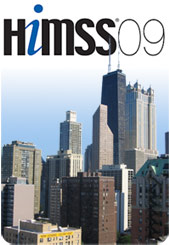HIMSS singing
- 9 April 2009
 Six weeks after President Barack Obama promised billions for electronic health records in the US, and with former Federal Reserve chairman Alan Greenspan on its speaker rota, this year’s HIMSS conference was always going to be about money and how to spend it effectively. Neil Versel reports from Chicago.
Six weeks after President Barack Obama promised billions for electronic health records in the US, and with former Federal Reserve chairman Alan Greenspan on its speaker rota, this year’s HIMSS conference was always going to be about money and how to spend it effectively. Neil Versel reports from Chicago.
Often it takes several days to figure out the real themes of the annual Healthcare Information and Management Systems Society (HIMSS) conference.
Not so this year. Perhaps the biggest news in the history of US health IT was delivered six weeks ago, when President Barack Obama approved more than $19 billion (£13 billion) in funding for electronic health records and other healthcare technology as part of his $787 billion (£535 billion) stimulus for the US economy.
When the hordes descended on Chicago this week for HIMSS09, they came to shop for or to sell systems and services. They came to learn from others in healthcare IT. But mostly they came to find out – and perhaps shape – how the US government is going to spend all that money.
Crunch: what crunch?
Even in this time of corporate austerity – and with a late-season snowstorm hitting Chicago on Sunday night – more than 27,500 people packed the massive McCormick Place complex, just 5% fewer than the record 29,000 who flocked to HIMSS08 in sunny Florida.
Total exhibit space was also down about 5%, despite the well-publicised absence of two major hospital systems vendors – Cerner and Meditech. The exhibitors that were present reported heavy traffic at their booths; and with good reason.
“Within 12 months from now, we expect most vendors to be backlogged 12 months or more [for new installations],” said Jack Smyth, president and chief executive of Spring Medical Systems, a Houston-based seller of electronic health record and practice management software for physician offices.
Smyth figures that ambulatory EHR vendors alone will have to hook up 2,000 to 3,000 practices a month for the next 69 months. Reporting on EHR use is to start in January 2011 for payments that will come in 2012, and US authorities will begin penalising doctors for not using EHRs in January 2015.
HIMSS CEO H. Stephen Lieber cautioned that those who delay purchasing health IT are going to get shunted to the back of the vendor queue. “Were I sitting in a CIO’s seat, I would be working on this now,” Lieber advised.
“You can’t wait until January of ’11. Get on this,” added Dr James Morrow, a GP in the Atlanta area who consults with other doctors on health IT adoption.
Defining “meaningful use”
However, there is a conundrum for the industry right now. The stimulus legislation requires providers to demonstrate “meaningful use” of technology in order to qualify for subsidies through either the Medicare programme for the elderly and disabled or the state-administered Medicaid programme for the indigent.
The law leaves it up to the US Department of Health and Human Services to define “meaningful use” by the end of 2009, and there currently is no head of that department.
President Obama’s first choice for health secretary, former senate majority leader Tom Daschle, withdrew his nomination after he under-reported income on tax returns, and other tax issues have delayed the confirmation process for the current nominee, Kansas governor Katherine Sebelius.
With this important point hanging, so much of the talk around Chicago was what “meaningful use” should and will include. HIMSS has put together two “strawman” documents – one for doctors and one for hospitals – about how to define the term, and is soliciting comments through 17 April.
“We’re going to start public dialog about this,” Lieber said. HIMSS will take the comments and put together a formal position paper by early May.
Spending on the right things
With all the excitement around the stimulus money, perhaps it was fitting that Alan Greenspan, the retired chairman of the Federal Reserve delivered a keynote address at HIMSS. After all, it was Greenspan who cautioned against “irrational exuberance” in the stock market back in 1996.
Now, the health IT industry is practically giddy with the prospect of a massive cash infusion, but also wary that this is the one big chance to get electronic health records right.
The reality check came from another keynoter, actor Dennis Quaid, whose 11-day-old twins nearly died in 2007 after human error at a Los Angeles hospital resulted in the babies being given 1,000 times the recommended dose of a blood thinner.
“Let’s make sure this money is spent wisely,” said Quaid, who has become a patient-safety advocate since the incident. “We have to make bar-coding, CPOE and electronic records common in all hospitals today.”
Quaid called for universal bar-coding in medication administration the way there is a universal bar-coding system in retail industries. “And make technology affordable to small, community hospitals,” he added.
He also said the next big step should be to make systems interoperable. “We have this great new technology, but it’s being used in a 20th Century way,” Quaid said.
“You are the leaders and I have faith that you will lead us to a better and brighter future in healthcare that will keep me and my family safe,” he told the health IT industry at its largest gathering of the year.




